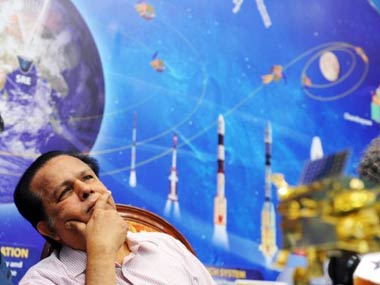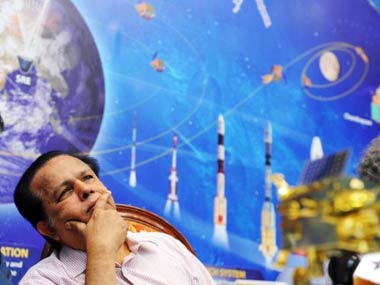The ‘star wars’ in the Indian space establishment has intensified, with the Indian Space Research Organisation (ISRO) releasing late on Saturday night the findings of a High Level Team that severely indicts former ISRO chairman G Madhavan Nair and others over a controversial deal to lease satellite transponders to a private company. The HLT headed by former Chief Vigilance Commissioner Pratyush Sinha , in its findings (
read the recommendations here
), pointed to “serious lapses of judgement” in the Antrix-Devas deal on the part of Madhavan Nair and three other senior space scientists, who were recently barred from holding any government posts, and other government officials. Antrix is the commercial arm of ISRO and Devas is a private firm floated by former ISRO officials. [caption id=“attachment_196237” align=“alignleft” width=“380” caption=“Former ISRO head G Madhavan Nair. AFP Photo”]
 [/caption] An earlier commission of enquiry, headed by BK Chaturvedi and Prof Roddam Narasimha, had found no basis for the concerns that S-band spectrum had been sold to Devas cheap, but pointed to “certain financial and strategic gaps” that needed to be fixed. (
Read the entire report here
.) The HLT report, however, noted that “there have not only been serious administrative and procedural lapses but also suggestion of collusive behaviour on the part of certain individuals and accordingly, responsibilities have to be fixed for taking action.”
Madhavan Nair had earlier demanded
that the reports, including the report of an internal committee headed by BN Suresh, be made public. In a statement released on Saturday (
full text here
) along with the recommendations of the HLT, ISRO appeared to suggest that criminal charges might be brought against some or all of the persons indicted in the HLT report. “If and when the Government decides to institute criminal or other charges against any person, that person will be provided appropriate opportunity and due process shall be followed,” the statement said. The statement added that the Ministry of Corporate Affairs and the Department of Revenue had been requested to conduct necessary investigation for possible acts of omission and commission. (Read an
interview that Madhavan Nair gave Outlook magazine
, in which he offers his side of the convoluted story.) Noting that the Antrix-Devas deal lacked transparency and due diligence, the HLT report recommended that action needs to be taken against Nair, A Bhaskaranarayana, KR Sridhara Murthi and KN Shankara all of whom have retired. “The approval process (for the deal),” the HLT report noted, “was riddled with incomplete and inaccurate information given to the union cabinet and the Space Commission.” The Antrix-Devas agreement was signed on 28 January 2005, but “this fact was not disclosed to the Space Commission or in the Cabinet note dated 27 November 2005, in which approval was sought for the launch of GSAT 6, one of the satellites to be build under the agreement.” The terms of the Antrix-Devas contract “were heavily loaded in favour of Devas,” it added. It pointed out that the terms of the agreement entail that while in the case of the failure of the satellite, the risk was entirely that of Department of Space, the success of of the satellite would commit the latter to substantial expenditure. Secondly, it said, “it is surprising that for the purpose of arbitration Devas has been considered an international customer even though its registered address in the contract is shown as in Bangalore.” The HLT report also noted that no clearance had been obtained from the legal cells of the Department of Space and the Finance Ministry for Antrix-Devas deal, as is mandatory for any international agreement by any department of Indian government. The report also said GSAT capacity was earmarked for Devas without consulting INSAT Corporation Committee (ICC), which recommends use of satellite capacities by non-government users authorised to provide telecom services, which is a “clear violation of the government policy”. The committee report said “there is evidence to suggest that the Antrix-Devas agreement was not disclosed to Technical Advisory Group (TAG) at the time of considering the experimental trials”. There was no indication of any attempt to identify other possible partners for providing the same service even though similar services were available in some other countries, it added. “Although SATCOM policy and ICC guidelines allow leasing of satellite capacity on first-come-first-served basis, this did not prevent Antrix-ISRO from following a transparent process of adequately publicising its intent of supporting such services…” it said. “In the absence of such a declaration of intent, choosing Devas seems to be lacking in transparency and due diligence”, the report said. The HLT report said that in the cabinet note, however, “an erroneous impression was sought to be created that ISRO was in receipt of several firm expressions of interest by service providers for the utilization of satellite capacity on commercial terms”. “This appears to be deliberate as the existence of the agreement was not disclosed even when seeking approval later of the Space Commission for the GSAT 6A satellite.” The committee also proposes action against four other scientists - SS Meenakshisundaram, Veena Rao, G Balachadran and RG Nadadur - “who have been found responsible for the acts of ommissions by not paying enough attention to details and not ensuring that the various notes that were put up for decision to the competent authorities included all necessary details and had undergone various necessary consultative processes”. (With inputs from PTI)
[/caption] An earlier commission of enquiry, headed by BK Chaturvedi and Prof Roddam Narasimha, had found no basis for the concerns that S-band spectrum had been sold to Devas cheap, but pointed to “certain financial and strategic gaps” that needed to be fixed. (
Read the entire report here
.) The HLT report, however, noted that “there have not only been serious administrative and procedural lapses but also suggestion of collusive behaviour on the part of certain individuals and accordingly, responsibilities have to be fixed for taking action.”
Madhavan Nair had earlier demanded
that the reports, including the report of an internal committee headed by BN Suresh, be made public. In a statement released on Saturday (
full text here
) along with the recommendations of the HLT, ISRO appeared to suggest that criminal charges might be brought against some or all of the persons indicted in the HLT report. “If and when the Government decides to institute criminal or other charges against any person, that person will be provided appropriate opportunity and due process shall be followed,” the statement said. The statement added that the Ministry of Corporate Affairs and the Department of Revenue had been requested to conduct necessary investigation for possible acts of omission and commission. (Read an
interview that Madhavan Nair gave Outlook magazine
, in which he offers his side of the convoluted story.) Noting that the Antrix-Devas deal lacked transparency and due diligence, the HLT report recommended that action needs to be taken against Nair, A Bhaskaranarayana, KR Sridhara Murthi and KN Shankara all of whom have retired. “The approval process (for the deal),” the HLT report noted, “was riddled with incomplete and inaccurate information given to the union cabinet and the Space Commission.” The Antrix-Devas agreement was signed on 28 January 2005, but “this fact was not disclosed to the Space Commission or in the Cabinet note dated 27 November 2005, in which approval was sought for the launch of GSAT 6, one of the satellites to be build under the agreement.” The terms of the Antrix-Devas contract “were heavily loaded in favour of Devas,” it added. It pointed out that the terms of the agreement entail that while in the case of the failure of the satellite, the risk was entirely that of Department of Space, the success of of the satellite would commit the latter to substantial expenditure. Secondly, it said, “it is surprising that for the purpose of arbitration Devas has been considered an international customer even though its registered address in the contract is shown as in Bangalore.” The HLT report also noted that no clearance had been obtained from the legal cells of the Department of Space and the Finance Ministry for Antrix-Devas deal, as is mandatory for any international agreement by any department of Indian government. The report also said GSAT capacity was earmarked for Devas without consulting INSAT Corporation Committee (ICC), which recommends use of satellite capacities by non-government users authorised to provide telecom services, which is a “clear violation of the government policy”. The committee report said “there is evidence to suggest that the Antrix-Devas agreement was not disclosed to Technical Advisory Group (TAG) at the time of considering the experimental trials”. There was no indication of any attempt to identify other possible partners for providing the same service even though similar services were available in some other countries, it added. “Although SATCOM policy and ICC guidelines allow leasing of satellite capacity on first-come-first-served basis, this did not prevent Antrix-ISRO from following a transparent process of adequately publicising its intent of supporting such services…” it said. “In the absence of such a declaration of intent, choosing Devas seems to be lacking in transparency and due diligence”, the report said. The HLT report said that in the cabinet note, however, “an erroneous impression was sought to be created that ISRO was in receipt of several firm expressions of interest by service providers for the utilization of satellite capacity on commercial terms”. “This appears to be deliberate as the existence of the agreement was not disclosed even when seeking approval later of the Space Commission for the GSAT 6A satellite.” The committee also proposes action against four other scientists - SS Meenakshisundaram, Veena Rao, G Balachadran and RG Nadadur - “who have been found responsible for the acts of ommissions by not paying enough attention to details and not ensuring that the various notes that were put up for decision to the competent authorities included all necessary details and had undergone various necessary consultative processes”. (With inputs from PTI)
'Space war' escalates: ISRO panel damns Nair, 3 others
FP Staff
• February 5, 2012, 07:14:33 IST
ISRO releases the findings of a committee that indicted former chairman Madhavan Nair and three other space scientists - and hints at criminal charges against them.
Advertisement
)
End of Article